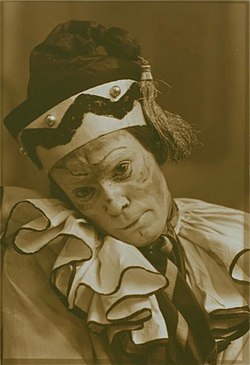Our website is made possible by displaying online advertisements to our visitors.
Please consider supporting us by disabling your ad blocker.
Petrushka
| Petrushka | |
|---|---|
 Nijinsky as Petrushka | |
| Choreographed by | Mikhail Fokine |
| Composed by | Igor Stravinsky |
| Libretto by | Igor Stravinsky Alexandre Benois |
| Based on | Russian folk material |
| Date of premiere | 13 June 1911 |
| Place of premiere | Théâtre du Chatelet Paris |
| Original ballet company | Ballets Russes |
| Characters | Petrushka The Ballerina The Moor The Charlatan |
| Designs by | Alexandre Benois |
| Setting | Admiralty Square St. Petersburg Shrovetide, 1830 |
| Created for | Nijinsky |
| Genre | Ballet burlesque |
Petrushka is a ballet burlesque in four scenes. Alexandre Benois and Igor Stravinsky wrote the story of the ballet. Igor Stravinsky wrote the music. Michel Fokine choreographed the work (designed the dances). Benois designed the sets and costumes. Petrushka was first performed by Diaghilev's Ballets Russes in Paris on 13 June 1911. Nijinsky played Petrushka, and Tamara Karsavina played The Ballerina. Alexandre Orlov played The Moor, and Enrico Cecchetti played The Charlatan.[1]
Petrushka tells the story of the loves and jealousies of three puppets. The three are brought to life by The Charlatan during St. Petersburg's 1830 Shrovetide Fair. Petrushka is in love with The Ballerina. She rejects him because she likes The Moor. Petrushka is angry and hurt. He challenges The Moor. The Moor kills him with his scimitar. Petrushka's ghost rises above the puppet theatre as night falls. He shakes his fist at The Charlatan, then collapses in a second death.
Petrushka brings music, dance, and design together in a unified whole. It is one of the most popular of the Ballets Russes productions. It is usually performed today using the original designs and dances. Grace Robert wrote in 1949, "Although more than thirty years have elapsed since Petrushka was first performed, its position as one of the greatest ballets remains unassailed. Its perfect fusion of music, choreography, and décor and its theme—the timeless tragedy of the human spirit—unite to make its appeal universal."[2]
- ↑ Balachine 1975, p. 305.
- ↑ Robert 1949, p. 231.
Previous Page Next Page


